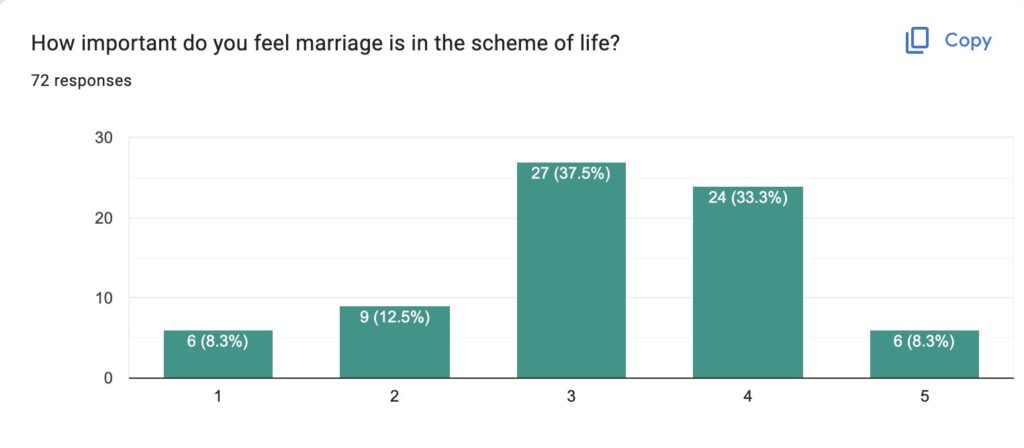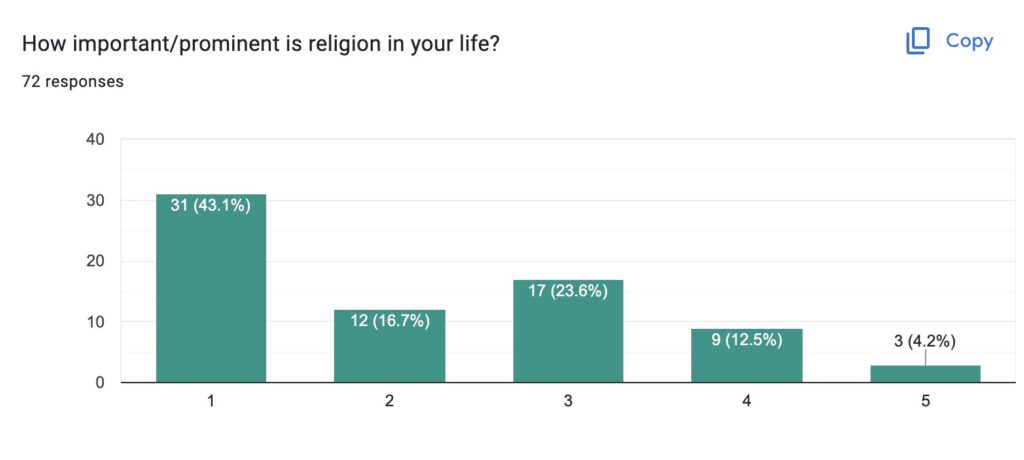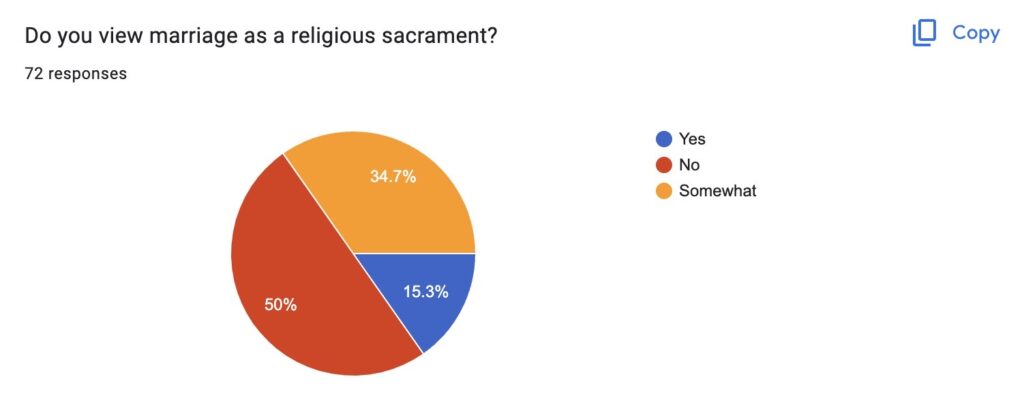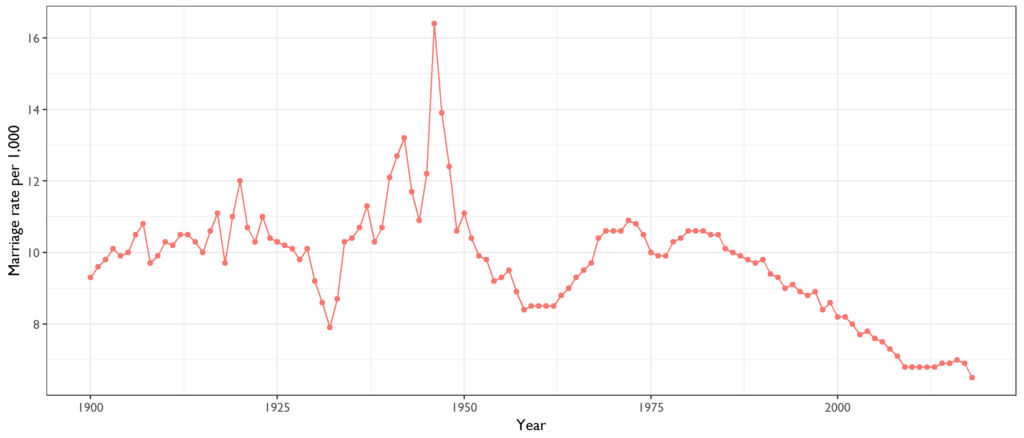In the dawn of major social change regarding lifestyle ideals, gender roles, and normalizing secular beliefs, marriage is slowly gaining a different reputation than it had centuries, or even mere decades ago.
Many people today have begun to overlook the religious origins of marriage and its historical context. In the Abrahamic religions (Christianity, Judaism, Islam), marriage was created as a loophole to the idealized life of celibacy. Marriage was the key to engaging in sexual intercourse without it being sinful… or as sinful as engaging out of wedlock. Due to its necessity in order to have sex, marriage became a function of family: if someone wanted to, or was expected to have children, they could not do so without getting married. From the 13th century up until the 16th century reformation era, marriage was seen by the Christian church as a holy sacrament, meaning the Church had jurisdiction over a couples’ personal relationship. Even though no longer a ‘sacrament’ in its proper sense, Christian texts (and therefore historic Hebrew texts as well) have long portrayed marriage as a metaphor of the relationship between God and the people.1
In teachings and societies that were heavily influenced by patriarchy, marriage served to affirm gender roles and heteronormative ideals as well. Different religious texts laid out rules and expectations for a husband and wife; even though interpreted through the patriarchal lens, teachings of Christianity and Judaism specified man and wife in marriage, presented limitations to sexual activities, and in ancient writings, made determinations for the ‘ideal wife’ (Proverbs 31: 10-31). It is also important to note that marriage was a necessity for women to sustain life for much of history, as they could not have financial independence. Even though women could start earning over a decade prior, it wasn’t until the Equal Credit Opportunity Act was signed into law in 1974 that women could open a bank account regardless of their marital status, and therefore without the possibility of being asked for their husbands’ signature. 2
In our modern day United States, marriage is seen much less as a religious union and much more as a proclamation of love and a financial statement.
While difficult to accurately assume the motivations behind a marriage, in todays world there are many more financial incentives that come with marriage, from joint taxes, to healthcare benefits, to citizenship; it is estimated that “since 1998, more than 2.3 million foreign nationals have obtained green cards through marriage to American citizens.”3 Not to say these motivations are necessarily negative, but they do take away from the religious narrative of marriage.
The Institute for Family Studies made an interesting observation that “marriage [has become] an opportunity for men and women to consecrate their arrival as successful adults, to signal that they were now confident they could achieve a fulfilling romantic relationship built on a secure, middle-class lifestyle”. The old fashioned model of marrying as soon as possible, and often without a preexisting long term relationship, differs greatly from the newer, more methodical marriage practices, therefore “more Americans see marriage as out of their reach, given the perceived economic and emotional requirements to get married nowadays”.4 So, rather than the common misconception that young Americans simply don’t have an interest in getting married, it seems at though they just have higher, less attainable standards for making the commitment.
In my own survey, whose population ended up being approximately 90% within the ages of 15 and 22, proved that even among younger generations, marriage seems to still be relatively important despite decreasing importance of religion in the participant’s lives.



So, what are the benefits of modern marriage, if not carried out for religious purposes?
Along with the financial benefits that accompany marriage, the new societal requirements for union (for both parties) have potentially had a positive influence on marital success, and hopefully, happiness and fulfillment within the long-term relationships. Even though “marriage rates are at their lowest in the past century, [divorce] is less likely today than it was 30 years ago”.5 As young Americans spend time developing their careers and more importantly, discovering themselves, before engaging in marriage, impulsivity and commitment to already doomed relationships decreases drastically.

United States marriage rate, 1900-2018
Rate per 1,000 population
Source: CDC/NCHS, National Vital Statistics System.

Change in divorce rates by state, 2000 to 2018
Rates per 1,000 residents
Dashed line is national average (-28.8%)
Source: CDC/NCHS, National Vital Statistics System.
Marriage has also been an important vessel for the LGBTQ+ community in the fight for equality. The legalization of same-sex marriage has not only served as a public proclamation of queer love, it also allows for governmental recognition of these relationships, and equal rights to the financial and healthcare benefits that their heterosexual counterparts have received for centuries.
- Luke Timothy Johnson and Mark D. Jordan, “Christianity” in Don S. Browning, M. Christian Green, and John Witte, Jr., Sex, Marriage & Family in World Religions, (New York: Columbia University Press, 2006), p. 82 ↩︎
- U.S. Department of Justice, “Equal Credit Opportunity Act”, U.S. Department of Justice, Civil Rights Division: September 14, 2023, https://www.justice.gov/crt/equal-credit-opportunity-act-3. ↩︎
- David Seminara, “Inside the Green Card Marriage Phenomenon”, Center for Immigration Studies, , November 30, 2008, https://cis.org/Report/Inside-Green-Card-Marriage-Phenomenon#:~:text=Over%20the%20last%20decade%2C%20marriage,through%20marriage%20to%20American%20citizens. ↩︎
- W. Bradford Wilcox, Nicholas H. Wolfinger and Charles E. Stokes, “The Role of Culture in Declining Marriage Rates”, Institute for Family Studies, March 10, 2016, https://ifstudies.org/blog/the-role-of-culture-in-declining-marriage-rates. ↩︎
- Matthew Davis, “The Changing Nature of Marriage and Divorce”, National Bureau of Economic Research, November, 2007, https://www.nber.org/digest/nov07/changing-nature-marriage-and-divorce. ↩︎
This conversation is one that I have with my friends a lot. I want to get married because I want the celebration of love, I want the symbolic ceremony (secularly), and honestly, it also would help my immigration status in this country to be married to an American citizen (which would help my future). I loved seeing all of the different reasons why people value, or don’t, marriage nowadays outside of religious perspectives. People in our generation seem to value the emotional benefits of marriage (which could be especially important to people in the LGBTQ+ community). Very illuminating presentation!
It was really interesting to hear about your shift in perspective as you gathered information for this project! I admire how you shifted the focus of the project when you learned things that contradicted your predicted outcomes, and the final product was really nuanced as a result. A lot of what you discussed surprised me and I learned a lot from your presentation!
This was a really interesting and thoroughly researched project! I enjoyed seeing how the reasoning for marriage has changed over time and allowed people to get married for a multitude of reasons. I’ve always thought the idea of marriage was really beautiful and this made me see how it can uniquely benefit and serve a wide range of people. I too enjoyed hearing how your initial view shifted as you researched your topic because I also thought people nowadays would place much less importance on marriage.
This project was so eye-opening – the surveys complimented your research well, and I really liked how you gave us insight on how your ideas and thinking changed as you learned more and more. I started to think about my own goals for my future, and it was really interesting to see other people’s perspectives. What really stuck out to me was when you mentioned marriage’s role in LGBTQ+ recognition and right to healthcare/financial benefits – I really enjoyed learning about this topic and your presentation was executed well!
This is a really great project! I think it’s interesting how economic incentives for marriage persist across time. In the past, women had a strong financial incentive because of exclusion from the workforce and childcare responsibilities and now there are tax and other benefits to being legally married.
Your project raised a lot of interesting points. One of those points is having children when not being married. Back then it was looked down upon, but now individuals are having kids without being married. But at the same time, we have people getting married to receive a green card. Marriage is not always about being in love, but sometimes it’s about getting something else when being married. It is interesting to think about how much has changed over the years.
The way marriage has evolved into being something done out of love and not of a holy sacrament. That transition from marriage being seen as an obligation to become an act of love and affection between the couple is shocking. I feel like people from my generation, don’t view marriage as a top priority in their life. They mostly focus on their careers or themselves and getting married is their last priority. I loved looking at the survey responses and seeing what the majority of the public believes about marriage.
This project really made me think and bring up some interesting questions! I would be curious to further explore how LGBTQ+ and/or poly folks view marriage and the role it has in their lives. I agree that it is partly shocking that this social institution seems to be one that is sticking around even among our generation which has moved away from many others.
I think something that your project highlighted is that younger generations no longer put a lot of value in marriage based on their religion but rather value marriage as a form to show pure love, commitment, and stability. I think is a really good topic, and I really like it considering that is something me and my friends speak a lot about. Among all of that it was really interesting to learn about other’s perspectives on marriage and how marriage despite how many generations have passed is still very prevalent.
Oh my goodness, you picked such a lovely topic to present on. This is something that I see so many people struggling with, especially in todays world where we are increasingly focused on professional success. The focus on marriage is certainly shifting, and the data you collected was absolutely fascinating! It is so interesting to see a discussion that I have weekly with my roommates, my friends, my sisters, or my partner. I am so glad that you were able to gather comprehensive data regarding this topic, and I think you did a fantastic job summing up the modern benefits of marriage! Overall, fantastic work!
I find this super interesting because I still dont know how I feel about marriage , but seeing people my age react to these ideas with hesitance just like I do, helps me reflect on how times are changing and society is deviating away from religious ideals in well established institutions such as marriage.
I thought the answers you got from the project were surprising as well because I thought that marriage wasn’t something that was valued as much by our generation. However, after reading into your post more it makes sense that while marriage is still valued it’s valued for different reasons like proclaiming your love and financial reasons as opposed to purely religious reasons. I truly admire all of the work you put into this project and found it very interesting!
I have internally battled with this subject for a while so it’s comforting to know that there is a shift happening and that I might not be the only one going through the motions of whether or not I want to get married. Perhaps growing up I actually did but after realizing what marriage means in terms of finance and emotion… I was planning on putting it off for as much as I could. I have this conversation with my mom every couple of months and what used to be a conversation about religion and the beatutiful sacrment of marriage is now a conversation about how I should pursue happiness and love with the right person and feeling a sense of stability before making such a commitment. Amazing job!
It was really cool to see how people still want to get married despite changing social norms and the presence of religion being very prominent. I think it si very common among our generation to dismiss marriage because of its structural components and the want to change things from past generations. However, it was very cool to see that a handful of college students still want to get married.
I had no idea how far marriage rates have fallen in the US since the 1980s. The big spike appears to be right around end of WWII which would track with lots of men coming home from war, getting married, and using gov veteran’s subsidies to buy a house in the suburbs. Definitely interesting to note how marriage has become much less of a religious thing over time (or about women being property).
I enjoyed your research done to find out the current opinion of marriage for certain demographics. I find it interesting that there are people in my generation that still want to get married, as I fall into this category. I have a conflicting view on marriage, though I still respect and want to take part in such a commitment with a partner I love and respect.